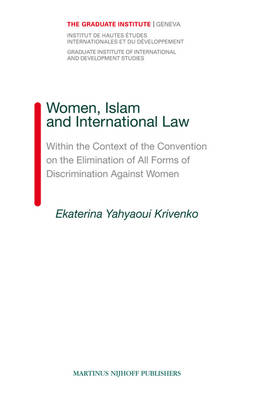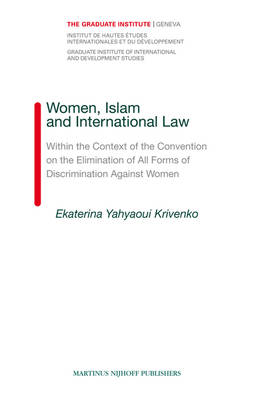
- Afhalen na 1 uur in een winkel met voorraad
- Gratis thuislevering in België vanaf € 30
- Ruim aanbod met 7 miljoen producten
- Afhalen na 1 uur in een winkel met voorraad
- Gratis thuislevering in België vanaf € 30
- Ruim aanbod met 7 miljoen producten
Women, Islam and International Law
Within the Context of the Convention on the Elimination of All Forms of Discrimination Against Women
Ekaterina Yahyaoui Krivenko
€ 244,45
+ 488 punten
Omschrijving
Islam and women's human rights entertain an uneasy relationship. Much has been written on the subject. This volume addresses it from a new perspective. It attempts to define some basis for constructive dialogue and interaction in the context of international law and, more precisely, in the context of participation of many Muslim States in the United Nations Convention on the Elimination of All Forms of Discrimination Against Women.
Having discovered a constructive potential in both Islam and women's human rights, the author concentrates on the role which international law should play in promoting dialogue and constructive interaction. This is done mainly through analysis of the regime of reservations and of the practice of reservations developed in the context of Muslim States' participation in the CEDAW.
The basic thesis defended is the following: Islam as articulated in the practice of States and women's human rights, as reflected in international instruments, are both results of human activity. Their analysis in this study reveals more commonalities than one might expect. International law should be more attentive to their voices and more innovative in using these commonalities in order to promote constructive dialogue between them and thus help to improve the situation of women suffering from discrimination and inequalities.
Having discovered a constructive potential in both Islam and women's human rights, the author concentrates on the role which international law should play in promoting dialogue and constructive interaction. This is done mainly through analysis of the regime of reservations and of the practice of reservations developed in the context of Muslim States' participation in the CEDAW.
The basic thesis defended is the following: Islam as articulated in the practice of States and women's human rights, as reflected in international instruments, are both results of human activity. Their analysis in this study reveals more commonalities than one might expect. International law should be more attentive to their voices and more innovative in using these commonalities in order to promote constructive dialogue between them and thus help to improve the situation of women suffering from discrimination and inequalities.
Specificaties
Betrokkenen
- Auteur(s):
- Uitgeverij:
Inhoud
- Aantal bladzijden:
- 280
- Taal:
- Engels
- Reeks:
- Reeksnummer:
- nr. 8
Eigenschappen
- Productcode (EAN):
- 9789004171442
- Verschijningsdatum:
- 13/11/2008
- Uitvoering:
- Hardcover
- Formaat:
- Genaaid
- Afmetingen:
- 165 mm x 244 mm
- Gewicht:
- 616 g

Alleen bij Standaard Boekhandel
+ 488 punten op je klantenkaart van Standaard Boekhandel
Beoordelingen
We publiceren alleen reviews die voldoen aan de voorwaarden voor reviews. Bekijk onze voorwaarden voor reviews.










